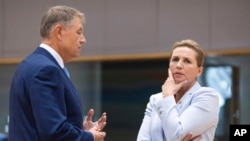EU leaders resume migration talks

BRUSSELS - European Union leaders opened a second day of migration talks on Friday as Poland and Hungary continued to block progress after they were voted down earlier this month on a plan to share refugees arriving in Europe among the 27 member states.
Some leaders said Poland and Hungary appeared to be fighting a battle that began years ago, when well over 1 million migrants, most of them refugees fleeing Syria, entered Europe in 2015, sparking one of the bloc's biggest crises. Others said the two simply must not be allowed to break EU rules.
"My feeling was that there was a lot of bitterness around the migration debates from 2015," Estonian Prime Minister Kaja Kallas told reporters at EU headquarters in Brussels. "If you just say no to everything and everyone else tries to compromise, it doesn't really work."
Slovenian Prime Minister Robert Golob said "Hungary was fully convinced" to have the issue removed entirely from the leader's final summit communiqué. "It wasn't about we're going to do it this way or that way. It was like, 'We don't want to see migration mentioned at all.'
Golob confirmed that European Council President Charles Michel, who is presiding over the summit, is likely to issue a separate presidential statement that does not require the approval of member states.
Earlier this month, EU countries made a breakthrough on asylum reform, sealing a deal on a plan to share responsibility for migrants entering Europe without permission.
The agreement balanced the obligation of countries where most migrants arrive to process and turn them in against the requirement for other members to provide support, whether financially or by taking in refugees. Countries that refuse to accept migrants can instead pay $21,400 per person.
The agreement was sealed with a qualified majority of around two-thirds. Only Poland and Hungary voted against. Their goal at the summit has been to question the legal validity of the decision.
Luxembourg Prime Minister Xavier Bettel said giving in would set a dangerous precedent.
"The fact is that Poland and Hungary do not agree with the (EU) treaty," he told reporters. "It's been decided, so we can't come back and say now, 'OK, we don't agree,' because then everyone is going to open up the list of all the decisions we've made in the last 10 years."
Ahead of the meeting, Poland's prime minister had insisted his country would not be forced to accept EU rules on migration, and he vowed to veto any plans that could force countries to take in refugees.
"An attack on Europe is underway. Europe's borders are not secure. The security of the inhabitants of our continent is at stake," Prime Minister Mateusz Morawiecki said in a video statement. He said he would propose "a plan for secure borders" to the leaders.
 Danish Prime Minister Mette Frederiksen, right, speaks with Romanian President Klaus Werner Ioannis during a round table meeting at an EU summit in Brussels on June 29, 2023.
Danish Prime Minister Mette Frederiksen, right, speaks with Romanian President Klaus Werner Ioannis during a round table meeting at an EU summit in Brussels on June 29, 2023.
Morawiecki said his "plan is clear - 'no' to forced transfers of immigrants, 'no' to violations of veto rights by individual states and 'no' to violations of the principle of freedom, the principle of decision-making by states alone, 'no' to Brussels -enforced penalties on states."
Poland and Hungary, along with the Czech Republic, refused to accept migrant quotas that were hastily imposed in 2015. The EU's top court ruled in 2020 that they had failed to respect the bloc's laws.
The number of people trying to enter the EU without a permit is increasing. Border and coast guard agency Frontex said more than 50,300 attempts were made from January to May. That's more than double the same period last year, and the most since 2017. But migrant arrivals in Europe dwarf those seen in Turkey, Lebanon or Jordan.
At the same time, Poland takes care of around 1 million refugees from Ukraine.
Any attempt to court help from Italian Prime Minister Giorgia Meloni, whose anti-migrant government abstained in the vote on the breakthrough deal, appears to have failed.
"I perfectly understand the viewpoints of nations that have different problems with migration. But I think the agreement that was found was balanced," Meloni told reporters.
While Hungary and Poland are unlikely to succeed in their bid to have the rules lifted, their anti-immigrant stance - supported by other members such as Austria, Denmark or Sweden - has helped ensure that EU policy focuses on keeping people out and quickly expel them. do not have the right to stay.
https://nord.news/2023/06/30/eu-leaders-resume-migration-talks/?feed_id=35776
Comments
Post a Comment